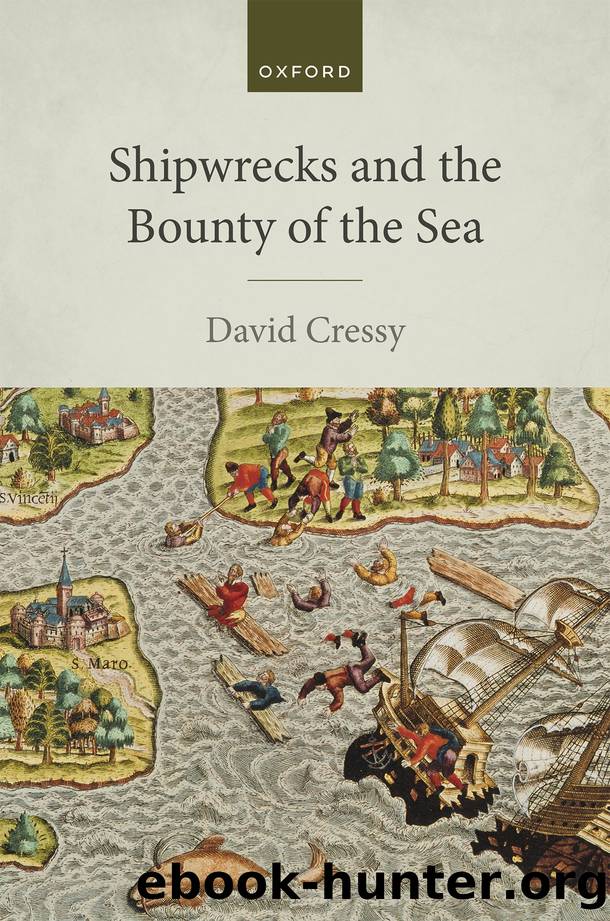Shipwrecks and the Bounty of the Sea by Cressy David;

Author:Cressy, David; [Cressy, David]
Language: eng
Format: epub
Publisher: Oxford University Press, Incorporated
Published: 2022-07-21T00:00:00+00:00
Cakeham, 1676
Among records of wreck inquiry from the later seventeenth century, one set stands out concerning an unnamed French vessel that came to grief on the Sussex coast near Cakeham, West Wittering, in November 1676. The grounding led to the usual scramble for the fittings and lading, in this case commercial quantities of fish. Salvagers came from the villages adjoining Chichester haven, on both sides of the boundary with Hampshire, some with boats, others with horses and carts. Cakeham, the wreck site, was a manor of the Bishop of Chichester, who had wreccum maris within his jurisdiction, and the depositions of the vice admiralty court that examined this incident are filed with episcopal records. Fourteen men and one woman gave testimony, naming thirty-seven individuals.45
It is evident that some of the Frenchmen survived the mishap (though deponents used the word âwreckâ), for they were able to sell some of their belongings to the salvagers. The records reveal no barbarity or violence, only the usual waterside opportunism of gathering and dealing. Several of the deponents insisted that they had made âfull discharge and satisfactionâ of their findings, by making payments to Edward Stanley, esquire, the droit collector for the bishop.
John Clark, gentleman of Westbourne, the salvager with the highest social status, âwent down with his boat to the wreck near Cakeham in Sussex several times, and brought away several parcels of fish for himself and others ⦠and also brought away in his boat three sails, whereof one cost him five shillings and another cost him three shillingsâ. He also acquired some pins of oil, and âone little gunâ, for which he paid 2s. 6d. Other light armaments retrieved from the wreck included a âmurderingâ piece and three small muskets.
William Hale, mercer, and George Sherlock, yeoman, worked together to unload fish and also acquired a little boat belonging to the ship, for which they paid 20s. The yeoman James Farr went down to the wreck âfour or five timesâ and used some of the fish to pay a neighbour âfor the loan of his horseâ. Richard Bolton, husbandman, âwas down twice with his boats at the wreck where the French vessels were run on shoreâ, and took loads of fish, a hogshead of oil, and âa little French bookâ. The oil, he told commissioners, was âfor my Lord Bartlettâs useâ, which he was âwilling to deliver to the proprietor [of] the French vessel, so that he may have a lawful discharge for the sameâ. Theodore Styler, yeoman of West Thorney, swore he had never been at the wreck, or anywhere near Cakeham, but he nevertheless had oil and boards from the French ship, which he was willing to deliver on demand. The victualler William Sparks of West Wittering allegedly tried to bribe or intimidate the watchmen assigned to guard the wreck, saying that âif they were gone he would give forty shillingsâ, that âhe could make a great advantage to himself in getting and carrying away the fish and goods belonging to
Download
This site does not store any files on its server. We only index and link to content provided by other sites. Please contact the content providers to delete copyright contents if any and email us, we'll remove relevant links or contents immediately.
Small Unmanned Fixed-wing Aircraft Design by Andrew J. Keane Andras Sobester James P. Scanlan & András Sóbester & James P. Scanlan(32578)
Navigation and Map Reading by K Andrew(4892)
Endurance: Shackleton's Incredible Voyage by Alfred Lansing(4511)
And the Band Played On by Randy Shilts(2017)
Wild Ride by Adam Lashinsky(1872)
The Box by Marc Levinson(1865)
Top 10 Prague (EYEWITNESS TOP 10 TRAVEL GUIDES) by DK(1852)
The Race for Hitler's X-Planes: Britain's 1945 Mission to Capture Secret Luftwaffe Technology by John Christopher(1742)
The One Percenter Encyclopedia by Bill Hayes(1720)
Trans-Siberian Railway by Lonely Planet(1632)
Girls Auto Clinic Glove Box Guide by Patrice Banks(1623)
Looking for a Ship by John McPhee(1576)
Batavia's Graveyard by Mike Dash(1554)
TWA 800 by Jack Cashill(1532)
Fighting Hitler's Jets: The Extraordinary Story of the American Airmen Who Beat the Luftwaffe and Defeated Nazi Germany by Robert F. Dorr(1519)
Troubleshooting and Repair of Diesel Engines by Paul Dempsey(1500)
Good with Words by Patrick Barry(1497)
Bligh by Rob Mundle(1492)
Ticket to Ride by Tom Chesshyre(1485)
